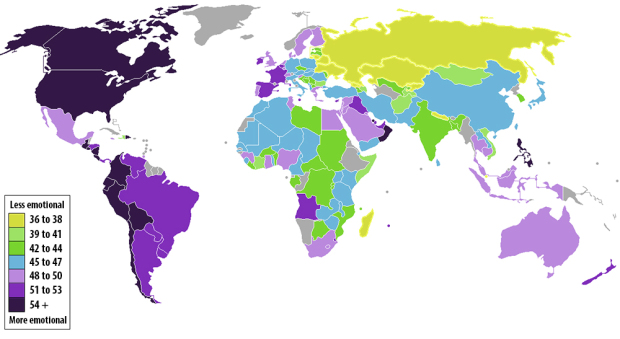Max Fisher for the Washington Post mapped country emotion ratings, based on the results of a recent Gallup study. Singapore was ranked least emotional, whereas the Philippines was ranked most emotional. The United States was also relatively high. From Gallup:
While higher incomes may improve people’s emotional wellbeing, they can only do so to a certain extent. In the United States, for example, Nobel Prize-winning economist Daniel Kahneman and Princeton economist Angus Deaton found that after individuals make $75,000 annually, additional income will have little meaningful effect on how they experience their lives. Consider this finding in the context of Singapore, a country with one of the lowest unemployment rates and highest GDP per capita rates in the world, but a place where residents barely experience any positive emotions. This research shows that it will take more than higher incomes to increase positive emotions or decrease negative emotions. Singapore leadership needs to consider strategies that lie outside of the traditional confines of classic economics and would be well-advised to include wellbeing in its overall strategies if it is going to further improve the lives of its citizenry.
I’m curious about what we’re seeing here though. The research infers wellbeing, but the survey was done by phone and face-to-face. Did Americans call overseas, or did residents call other citizens? The former might be kind of weird for some.
More importantly though, they asked questions like “Did you smile or laugh a lot yesterday?” and “Did you experience enjoyment?” Some cultures just don’t express emotions, but it doesn’t mean they don’t feel them. (Read as: I’m not a robot! I have feelings, too!)
[Thanks, John]



I just don’t see what any of this has to do with emotion, happiness, or wellbeing. First of all, happiness (at least in the sense of positive emotional affect) is not the same thing as wellbeing. Second, emotion is not the same thing as happiness (since there are negative emotions as well as positive ones). And third, I’m not convinced that the survey even does an adequate job of measuring the amount of emotion that people experience.
Here are the survey questions that were used:
– “Did you feel well-rested yesterday?”
– “Were you treated with respect all day yesterday?”
– “Did you smile or laugh a lot yesterday?”
– “Did you learn or do something interesting yesterday?”
– “Did you experience the following feelings during a lot of the day yesterday? How about (enjoyment, physical pain, worry, sadness, stress, anger)?”
Apart from the third and fifth questions, I’m not really sure what any of this has to do with emotion. And I haven’t a clue what merely adding up the positive responses to these five questions is supposed to tell us about the respondent’s happiness or wellbeing. I would really like to understand the theoretical rationale for why these particular questions were used, and exactly what they’re supposed to be measuring. Only then can I have any hope of understanding how I ought to interpret these results. The fact that there does appear to be significant cross-cultural variation in whatever this survey happens to be measuring is certainly interesting. But, without some clear indication of what is actually being measured (as opposed to what Gallup claims is being measured), this interesting pattern is little more than an intriguing curiosity from which no substantive conclusions can reliably be drawn.
Sorry, but what a BS
USA is more emotional than Italy ROFL
You guys need to call that map who whine more it would fit perfectly
While I can’t know for sure (and have not read their methodology) the usual research approach is that one designs a globally applicable questionnaire, data collection is commissioned locally and data processing is done centrally. So, for example, Greeks have called Greeks and Chinese people visited Chinese homes and Americans have crunched the numbers.
Hope this helps
A critic is a man with no legs teaching others how to walk! Who the heck Americans telling what we Singaporeans should rethink our economic strategies. These researchers can stand right in front of me, and I’ll box the daylight out of them to demonstrate how emo even a Singaporean can have. Making telephone calls, to fill up some questions mapping, and ‘presto’ they are fortune tellers! Hey, man, it shows noble prize giving is crap!
i see the very emotional usa is also the leading country for murders using guns–by a wide margin. i also see emotion as a hindrance to reasonable thought and more compatible with religion.
We now have another title – the “least positive” country in the world